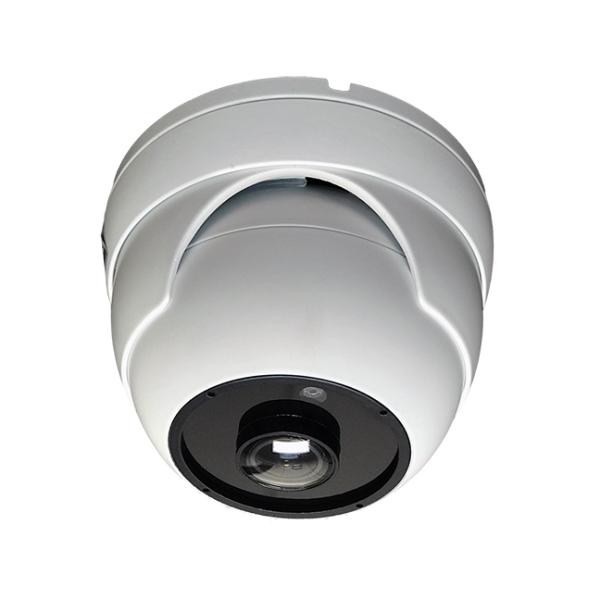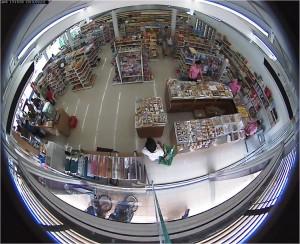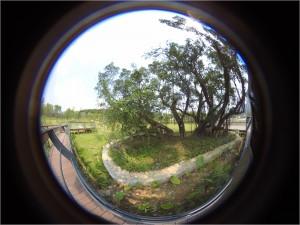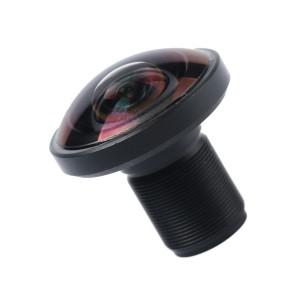1、What is fisheye cctv camera?
A fisheye CCTV camera is a type of surveillance camera that uses a fisheye lens to provide a wide-angle view of the area being monitored. The lens captures a 180-degree view, which makes it possible to monitor a large area with just one camera.
The fisheye cctv camera
The fisheye lens produces a distorted, panoramic image that can be corrected using software to provide a more natural-looking view. Fisheye CCTV cameras are commonly used in large open spaces such as parking lots, warehouses, and shopping malls, where a single camera can cover a wide area.
They can also be used indoors to monitor large rooms, such as conference rooms, lobbies, or classrooms. Fisheye CCTV cameras have become popular due to their ability to provide a wide-angle view of a scene, which reduces the need for multiple cameras, making them cost-effective and efficient.
Fisheye lens application
2、What are the advantages and disadvantages of fisheye lens in the use of sucurity and surveillance?
CCTV Fisheye lenses can offer several advantages and disadvantages in the use of security and surveillance.
Advantages:
Wide coverage: Fisheye CCTV camera lenses provide a wide-angle view, which means they can cover a larger area compared to other types of lenses. This can be particularly useful in surveillance applications where a large area needs to be monitored with a single camera.
Cost-effective: Since a single fisheye camera can cover a large area, it may be more cost-effective to use one fisheye camera instead of multiple cameras with narrower lenses.
Distortion: Fisheye lenses have a characteristic distortion that can be useful in surveillance applications. The distortion can make it easier to see people and objects near the edges of the frame.
Distortion of fisheye lenses
Disadvantages:
Distortion: While distortion can be an advantage in some situations, it can also be a disadvantage in others. For example, if you need to accurately identify someone’s face or read a license plate, distortion can make it difficult to get a clear view.
Image quality: Fisheye lenses can sometimes produce lower quality images compared to other types of lenses. This can be due to factors such as distortion, aberrations, and lower light transmission.
Installation and positioning: Fisheye lenses require careful installation and positioning to achieve the best results. The camera needs to be placed in the right location to ensure that the area of interest is captured in the frame without being distorted or obscured by other objects. This can be challenging and may require additional time and expertise.
Storage space: Fisheye lenses capture a lot of information in a single frame, which can result in larger file sizes and require more storage space. This can be an issue if you need to store footage for long periods of time or if you have limited storage capacity
3、How to choose a fisheye lens for CCTV cameras?
Fisheye lens for cctv camera
When choosing a fisheye lens for CCTV cameras, there are a few important factors to consider. Here are some key considerations:
Focal Length: Fisheye lenses come in different focal lengths, typically ranging from 4mm to 14mm. The shorter the focal length, the wider the angle of view. So, if you need a wider angle of view, choose a lens with a shorter focal length.
Image Sensor Size: The size of the image sensor in your CCTV camera will affect the field of view of the lens. Make sure to choose a fisheye lens that is compatible with the image sensor size of your camera.
Resolution: Consider the resolution of your camera when choosing a fisheye lens. A higher resolution camera will be able to capture more detail in the image, so you may want to choose a lens that can handle higher resolutions.
Distortion: Fisheye lenses produce a characteristic distortion in the image, which can be either desirable or undesirable depending on your needs. Some fisheye lenses produce more distortion than others, so consider how much distortion you want in your images.
Brand and Compatibility: Choose a reputable brand that is compatible with your CCTV camera. Make sure to check the specifications of both the lens and the camera to ensure they are compatible with each other.
Cost: Fisheye lenses can vary greatly in price, so consider your budget when choosing a lens. Keep in mind that a higher-priced lens may provide better quality and performance, but may not always be necessary depending on your specific needs.
Overall, when choosing a fisheye lens for CCTV cameras, it’s important to consider your specific needs and requirements in terms of angle of view, distortion, resolution, and compatibility.
Post time: Apr-18-2023







